Market Dominance Guys
Value of the Meeting
Episodes
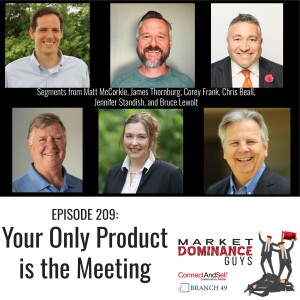
Wednesday Jan 10, 2024
EP209: Your Only Product Is the Meeting
Wednesday Jan 10, 2024
Wednesday Jan 10, 2024
Closing sales requires trust, and trust is built through conversation. As Chris Beall notes, in B2B, the gateway to ongoing dialogue is the discovery meeting. Yet, too often, sales teams fail to view the meeting itself as the product they are selling. As Bruce Lewolt highlights, sellers must frame their sincere care for the customer’s success. This care is best conveyed interpersonally. By securing that initial meeting, the sales rep opens the door to relationship-building. As Jennifer Standish explains, delivery matters as much as content in piquing interest. With the right tonality and empathy, a seller can turn cold calls into warm introductions. James Thornburg and Matt McCorkle build on this idea: the meeting is a gift, saving the prospect time and money. When sellers view appointment-setting as customer service, their conviction carries through. The discovery meeting enables the sales conversation to continue. Building trust starts with booking that first meeting. Join us for episode 209: Your Only Product Is the Meeting.
This episode has segments from the following full episodes featuring Matt McCorkle, James Thornburg, Corey Frank, Chris Beall, Jennifer Standish, and Bruce Lewolt.
EP139: Your Product Is the Meeting
EP122: Learning to Manage Your Voice Under Pressure
EP115: The Enemy of Your Message Is Drift
EP113: The Cold-Call Kiss of Death
EP108: Sales and the State of Apprehension
FULL EPISODE TRANSCRIPT Below:
Chris Beall (00:00):
I think that's what we do primarily in sales is we help people go from the emotional state they're in to one that would be more conducive to getting to an exploration of possibilities. And when we think of it differently, I think we get in trouble.
Matt McCorkle (00:16):
Yeah, I really like that analogy of being on the phone with somebody and the value of the meeting is saving them from an oncoming train or a bus or whatever you're saying. What we say is that this one isn't nearly as impactful, but when we're training we say you are giving the person you're talking to a hundred dollars, are you going to be excited and happy to give this person a hundred dollars because you're saving them that money simply by showing up and showing them some of the knowledge that we have at Ksr for their operation. Absolutely. You're not taking a hundred bucks from them. You're not wasting their time. You're giving them a hundred dollars and here's the a hundred dollars of value you're giving them. That's when we use, pretend like you got a hundred dollars and you're pocket and you're just walking up to somebody to say, here you go. No strings attached. Here's a hundred bucks. Help with that confidence. Absolutely right. Corey,
Corey Frank (01:09):
What's more fun for you? Do you have a balance of how often do you do cold calls? How often do you do discovery and do you yearn for doing one over the other?
James Thornburg (01:19):
I'm enjoying it all. To be frank. Right now I have a great process. I make calls maybe like an hour, an hour and a half a day, typically four or five days a week, pretty much every day, anywhere between nine and 11. And then in the afternoon it's dedicated to meetings. And depending on the day, I may be running two or seven different meetings. They might be net new meetings, they may be follow-ups, things of that nature. And then what people don't get to see, and it's kind of hard to understand is there's a whole world of selling and working deals behind the scenes with the different providers in terms of registration and things of that nature. Competitors, I mean, it's a knife fight. And what people don't realize about this business is that these deals don't always go through the front door. Traditionally how people expect them to be. I mean there's a lot of maneuvering on opportunities to get things done.
Corey Frank (02:10):
How about from a metrics perspective, James? I think Chris, at any given time you give him seven seconds notice. He'll pull up the data and the stats for his team and know within the first hour of the day if they're off or who needs help on the intro, who needs help on tonality as kind of the proprietor of your own practice there. Do you look at the stats at that level of tactical detail of how you're doing 'em one day or to the other and dial the connect or dialed a meeting or if you're getting your butt kicked in the intro, maybe it's a tonality thing and I should probably change it up. How do you use math of the data to alter or calibrate your sales process?
James Thornburg (02:51):
I do have a general idea in terms of what my numbers look like. I don't get overly concerned about, Hey, what my conversions are down this month. I just think it's a trend. I mean, you look at, last week for me, I set five meetings like an hour and a half, never happened before. This week I'm at one meeting, one meeting probably 20 conversations. So it's not horrible but not great. And so it flows. It flows and some days I'm better than others. I can feel it. You just know the conversations or I'm catching the right people. But I have a good idea in terms of my conversions, I mean, well data connect's kind of irrelevant I guess right now, but do connect was trending at probably close to three and a half, probably three and a half percent. But my conversions on my conversations are right around 10 out of 10 people I talk to. I'm converting one of those.
Chris Beall (03:45):
The disease that kills companies is distraction. That's why little companies shouldn't do strategic partnerships with other little companies that give each other the disease called distraction. And it's highly communicable, so be careful of it. You need focus and the focus is starts with the list. It's really easy to stay focused when you have that list. You can go through the list and say, have we talked to everybody on this list? We haven't. Let's take the ones we haven't talked with and try to talk to them. Okay, if somebody wants help doing that, come to me. I can help you talk to a whole bunch of people. That's what we do is like talk to folks and we help you talk to people. Have we got a meeting with everybody on the list? Not yet. Well, we have a job to get a meeting with the rest. Have we learned from the meetings that we've had, what resonates? So what percentage are resonating on the economics, what on the emotional and what on the strategic and what didn't resonate at all? That's a little trickier, but it's very objective step by step by step, and by going step by step, we do take care of immediate needs because guess what? We'll actually be closing business sooner than not. And the best part is it keeps getting easier instead of getting harder. That's the reason you do this.
Jennifer Standish (05:06):
I also think that we have to accept that a certain percentage of the population doesn't like to be sold to and they will shut down meetings to their own detriment. But there's nothing you can say to them. They just will not be sold to. And we just have to accept that. But everybody else is someone willing. Some people are more willing than others. I've had situations where I get no objection. I get sure, I'd love to. Absolutely. I'm available on this particular date and time and it's super easy. Other times there's a little bit of pushback, but then people are amenable. It's to scheduling appointments. So we just have to accept that some people are more willing to meet with people and are interested in what people have to
Corey Frank (05:52):
See. Jen, how much of that do you think, and you've seen, you've probably experienced bad calls. You've probably from your background, taught many folks to learn this skill. You have a voice. We have a handful of folks on this podcast, all brilliant folks, of course, present company included with me and Chris. But a lot of the folks that are on these podcasts of ours, they have a voice that can just melt butter and they have a command of their tonality, their stammer, their pregnant pauses. Is that something that you see as correlating to your success? Yes.
Jennifer Standish (06:29):
When you're, and I'll tell you, trainers, cold calling trainers, do not spend enough time working with people on their delivery because it's 80% of your success as a cold caller. A great script hits all the points with a terrible delivery. We'll get no appointments, but a great delivery with a mediocre script, we'll still get you appointments. Absolutely.
Bruce Lewolt (06:58):
So there's the athletic, the endurance, taking the brunt of rejection and still coming back strong. There is also, and to Corey's point at the sincerity, I really care about helping students. If you're a corporation, I really care about helping salespeople reach their full potential and do well. I care about helping your business do well. So that comes through to me. But when I train salespeople, I recognize if they work for a big electronics company, they may or may not care as deeply as I do about their customer doing things. So my daughter was a successful actress when she was young in Hollywood. She was on a lot of national shows and a lot of acting, trading, and they use framing, what's my frame here? How am I looking at the world? So for the salesperson, before they start, they need to do the same exercises that an actor does beforehand to get themselves in the right frame seeing things in the right frame. So they are coming across as caring. They are coming across if need be as very confident, or they are coming across as, I'm struggling a little here, could you help me? The broken wing script, if that's what they're doing.
Chris Beall (08:13):
Well, one of the beauties of B2B is that B2B tends to run through a meeting. You're going to have a meeting, and the meeting is a meeting in which both people are going to voluntarily show up. And the fear that's expressed as annoyance, it's going to be replaced by apprehension that you can replace with some other emotion. And it's a lot easier to work with apprehension on a volunteer than it is to work with fear on somebody you've ambushed. It's an easier emotional sort of game to play when we're dealing with that more awkward conversation. The cold conversation. One of the beauties is, the only thing you have to believe in deeply and sincerely, is the potential value of the meeting for the human being you're talking to in the case where you're never going to do business with them, and this is the only time in business.
(09:03):
I think there's such a thing as a universal framing. You can deeply believe no matter what you're selling, you can deeply believe my company are experts at this because we're specialists and this other person is a generalist and can learn from us. And what strikes me as especially odd is the product training that goes on for salespeople, even those who are setting meetings, is not about the product that they're selling, which is the meeting. So they never learn about that product, which is the only product that they have to sell and be sincerely to have that sincere belief in its value. And it's so odd. I have yet to see one time across all of B2B that I've run into, and you guys know, I see a little bit of it. I've never had a yes answer to this. So can you break down the discovery meeting for me that this person's going to have? Who says yes in terms of the value that they're likely to receive from attending that meeting?
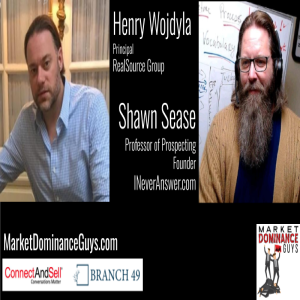
Tuesday Dec 12, 2023
EP206: Mastering the Art of Silence How Pauses Can Improve Discovery
Tuesday Dec 12, 2023
Tuesday Dec 12, 2023
What's the secret sauce to nailing discovery calls? Is it your intricate questioning strategy? Your ability to build quick rapport? We're exploring an underappreciated element today - the power of tonality.
From a Marine drill sergeant's verbal shock and awe to real estate power players commanding eight-figure deals, our esteemed guests get vocal about vocal dynamics.
Join Chris, Corey, and their guests, Henry Wojdyla and Shawn Sease as they battle assumptions, pregnant pauses, and the occasional restraining order. You'll hear straight from the horse's mouth why tonality eclipses terminology and how losing your cool in discovery can cost you deals. If your team overlooks today's vocal victory tips, you'll condemn them to tone-deaf discovery call defeats. Listen to this episode: Mastering the Art of Silence: How Pauses Can Improve Discovery
Links from this episode:
Shawn Sease on LinkedInHenry Wojdyla on LinkedInCorey Frank on LinkedInChris Beall on LinkedIn
Branch49ConnectAndSell
FULL EPISODE TRANSCRIPT Below:
Corey Frank (01:14):
Welcome to another episode of the Market Dominance Guys, with Corey Frank, and of course, always at my virtual side is Chris Beall, the stage of sales, the prophet of profit and the hawking of caulking. But we also have two other extra special guests. We happen to be graced in our in-house home Phoenix GCU-based studios with the professor of prospecting, Shawn Sease himself. Good afternoon, Shawn.
Shawn Sease (01:42):
Good afternoon. Thanks for having me.
Corey Frank (01:43):
And we have one of our eight registered listeners, Chris, of our podcast, the most gracious and esteemed Henry Wojdyla from RealSource. Henry, it's great to have you on the podcast, back on the podcast. I think you're one of our earlier guests, I believe so, Chris. So good to have you, gentlemen. We have a first here at Market Dominance Guys. We actually have four talking heads, three brains amongst four talking heads, so we'll see what we can do here.
(02:12):
What we wanted to talk about is something we were talking about before we jumped on air. And Chris, I want to have you have the opportunity to tee up Henry, because I thought it was a compelling topic about tonality, but not just in cold calls, which we often talk about the surfboard and the surfer. But Henry brought up a very compelling point. Shawn, I'd like to get your take on this too, about the importance of tonality and when and how you use it in discovery calls. Chris, so I'll leave it to you to tee up our good friend Henry here and let's dive into this topic.
Chris Beall (02:42):
Sure. I mean, the conversation we were just having was about how much of the, well, we were talking a little bit about Branch 49 and how much of the waterfront makes sense to cover or the funnel or whatever. The big question is always, where's the bottleneck? We always talk about theory of constraints on this show, and we also know if you ever address the bottleneck, you got to stand back. You have to stand back when you've done something about the constraint and see if it moves and if so, where it moves because it's actually not easy to predict. It could move up or it could move down, so to speak, in the processes. Doesn't move sideways too often.
(03:16):
And Henry was talking about how when we were just chatting out there, not where you're sitting, not where he's sitting or he's sitting or I'm sitting, but where somebody else's or you're sitting, Corey. He was talking about how the tonality and disfluency is also the whole tonality package I call it, has actually become as important or more important to him as he's evolved in the way that he does discovery. And what I thought was so cool about what he hit on is we call it the confessional. And the question is, well, what are you confessing to? And while you're doing that confessing, are you learning? Are you getting self-knowledge, knowledge of your situation as a result that's facilitated by the conversation? And I think that was a point that Henry was making. So at that, Henry, what was the point you were making? Because frankly, I was just eating tacos and listening in.
Henry Wojdyla (04:09):
Well, it was probably the ride-on piece to the opening comment I made about some recent conversations, Chris, you and I have had, and I'll keep it brief to get back to your question. But the fact that the top of funnel has been improved so much by the good thinking here from Market Dominance Guys, the facilitation from ConnectAndSell, it gets back to the wood-turning analogy that you had so wisely laid out probably at least a couple of years ago on this podcast. But the idea that I can get enough reps in that I'm beginning to pattern match and seeing ghosts in the machine, so to speak, as it relates to discovery. And a lot of what I've been discovering about my own discovery process has been effectively getting out of the way. And a lot of getting out of the way is facilitating the prospect to do more and more self-discovery.
(04:54):
I will tell you that I'm not quite, I don't have a fully baked theory on this yet or the framework has not been completely fleshed out. So this is definitely a work in progress and I'd say some of my insights are only really becoming to manifest in the last couple of months, but tonality has been a huge piece of that. So getting back more to the core of what Corey and you are asking me. The tonality piece, not just open-ended questions, but the framing of those questions in a way that elicits, I think hopefully a sign of genuine concern and a search for meaning from the prospect so that they can effectively self-discover by being more open, not necessarily just from a trust perspective, but I think almost more open in their own thinking, what they are willing to put out there. I know I'm speaking in very broad strokes, but nonetheless, it's like I said, it's a work in progress, but I'm realizing just how crucial tonality is in the discovery call.
(05:50):
I was thinking it was primarily in the domain of a cold call. It very much is too. But I've been slowly peeling back the layers of my own self-limiting beliefs on this topic. And in fact, Corey, as I think I mentioned to you a little bit before, I was frankly a bit skeptical when I was an early listener of just the importance of phrasing, tonality, voice. I thought, "Oh, that's just huckster salesmanship type stuff," and I'm a convert. So I've come a long way in that and I'm just realizing that not only is it important, but it's important across a broader range of the sales cycle.
Corey Frank (06:26):
Well, it still may be huckster sales-type stuff, but it works. It's the laws of gravity. I may not believe in gravity, but gravity believes in me. Shawn, from your perspective, especially being a DISC connoisseur, what do you say to what Henry is confessing to us here about tonality and with the four different types of personalities perhaps are some personalities more susceptible, more open to that verbal disfluency, the ahs and the ums and generating that authenticity where it doesn't sound like a TED Talk, it doesn't sound like the 150th time I've done this?
Shawn Sease (07:06):
I think that the research on the personality stuff, especially the DISC, the four different personality types, that data is pretty conclusive that it does matter how you speak to people. But it's probably not, it's one of many, many different data points. But to answer your question directly, to get in the weeds a little bit, the I, the influence type in DISC are the kind of people that will eat up a whole entire discovery call talking about their fishing trip if you forget to get them on task. And in contrast, example to that is if you're talking to somebody calculative like a CFO, an engineer or something like that, you may want to dispense with pleasantries. But on the other hand, I think it's still very effective to just be mindful of the words that we use, like genuine transparency or being transparent, being genuine, being authentic, empathetic, things like this.
(07:57):
If you're not being true to those definitions, I mean, in even a maybe religious way or something like that, if it's not true, then it comes across as disingenuous and that just reeks. It reeks of sales and commerce and things like this. And so yeah, there's no doubt about it, tone, pace, pitch, all very important. And if you're listening pretty well, people will tell you everything and people are just dying to tell you their stories. And that's what I always find weird about people who have trouble with discovery. And I would trace it right back to your inability to not only create a rapport with somebody so that you have a longstanding rapport, but at the very moment that you start a conversation that you can enter a rapport.
(08:36):
And let me give you an example. Frequently, I send Chris weird messages maybe at 8:00 or 9:00 or 10:00 at night or something like this when I have an idea. And Chris will come back and tell me, "Hey, it's a bad time. I'm walking. I'm getting on a plane to go to Europe," or Australia or something like this. So Chris and I have a rapport, but sometimes when I call him up, it's the wrong time and we have an inability to begin a rapport, to have a conversation about what I wanted to talk to you. Timing's not right. And just pay attention to what someone's telling you and they'll tell you everything you need to know.
Corey Frank (09:04):
Do you find, that's an excellent point. It begets the question, Henry and Chris, on to partition a discovery call. We could break this down like our friend Oren Klaff does when he does a pitch. Are there certain aspects, Henry and Chris, when you're conducting the discovery call that you've found or that you discovered require more sensitivity to tonality, verbal disfluencies than other portions of the call? For instance, you're talking about pricing, you're talking about pain, or when you're talking about building the rapport upfront, anything that you've observed or anything that you discovered in that area?
Henry Wojdyla (09:44):
I would say if I had to frame it, if there's a typical structural pattern to my discovery calls, it's probably, I'll call it step two. The first step to some degree is a little bit of a slight recalibration of, okay, why are we here? Why are we assembled today? I will provide a little bit of additional contextual reminder of why we had reached out because it's not uncommon that our discovery calls, I mean, I'm speaking for the most part to fairly senior-level executives. So at the earliest, we are usually two weeks beyond when that discovery call was scheduled. They have full calendars, they're busy. So there's just a little bit of the first phase of a bit of reminder, some context, here's what we do, here's where the Venn diagram overlaps. Hopefully, that process is a little bit of a trust that's being reestablished or built upon even further.
(10:28):
Again, the tonality can be part of that. But I would say as parts of really the discovery is then trying to transition out of that because it's not really a commercial about us when I open, it's just a contextual framework. Then it's about getting into them what they're doing, what's on their, I guess their windscreen? What are they looking at or through that is really directing where they're vectoring as a company, as a firm. In our world where we're dealing with a subset of commercial real estate assets, so there's a lot of things that tie into not only internal factors, but external factors. And I think it's getting a lay of the land. And then they contextualize their piece. Now we've gone from serving up from our side a contextual reason why we're here today. Then we get phase two where they have responded back somewhat contextualizing where they fit in the marketplace, and then we start diving into the here and the now.
(11:21):
And I think that's where, we would call it step three, where I'm beginning to get this, getting back to the piece we're talking about, which is getting them to dial into the moment. Where does their company fit into the framework of the current market, the current dynamics? How are they seeing on a go forward basis? And getting them to start having thoughtful, self-reflective conversation. That's the piece that I was referring to earlier. So that's a very long-winded answer to your question. I would say it's that third step, if you will. And again, like I did mention a moment ago, this is still a work in progress for me, so that my thinking is not as clarified as I'd like it to be on this. But I can just tell you this is again, this is some of the pattern matching that I'm starting to see unfold here over the last few months.
(12:08):
Selling a big idea to a skeptical customer, investor or partner is one of the hardest jobs in business. So when it's time to really go big, you need to use an uncommon methodology to gain attention, frame your thoughts, and employ successful sequencing that is fresh enough to convince others that your ideas will truly change their world. From crafting just the right cold call screenplays to curating and mapping the ideal call list for your entire TAM, Branch 49's modern and innovative sales toolbox offers a guiding hand to ambitious organizations in their quest to reach market dominance. Learn more at branch49.com.
Corey Frank (12:55):
And Chris, you're a big believer in our friend Chris Voss and a lot of the mirroring techniques that he used. And I could see how mirroring could be incredibly effective in certain aspects of discovery.
Chris Beall (13:07):
Yeah, I mean, I divide these conversations into two big domains. One is the domain of the factual, where you're relatively safe talking about things that are factual. Some might be more sensitive than others. Facts, if somebody were to get in a discovery call with me and two minutes into the call they say, "So Chris, what's connectandsell? What's your current run rate revenue? What are your gross margins? And who on your team are you most concerned about that you think you might have to do something about?" And they do that two minutes in, it's like, I can go on there. Whereas in a second call or somewhere, sometime we really have a reason to talk about those facts, they won't have to be as skilled and just waiting helps. That's what Shawn was talking about. Just sometimes you just got to wait.
(14:00):
A disfluency is simply a form of waiting. You're waiting and letting that moment be filled in with what's in their mind. It's like when I teach really young people to play the piano, I always make this point, which is you only need to provide the structure, the sound, they'll fill in the rest in their head. The music happens over there, not out here, and not in our hands. It happens inside of them. But then there's another whole range of things that we do end up sometimes hitting on, which are really sensitive issues, like political issues internally, or concerns that this person might have about their own job, or maybe they're not going to be at that company anymore. And if they would tell you that, that'd be great. Where I think we get hung up there, and where I think tonality, disfluencies, mirroring, all of these techniques that... I never really think of them much as techniques, but all of these kinds of things you could find yourself doing if you were any good at this stuff.
(14:58):
Where they're just super important is where it's highly likely there are incorrect assumptions being held by you and by the other party. And it's really hard to get underneath incorrect assumptions because in order to correct one, you have to give up something that you believe. You have to or they have to. People don't like to give up anything. We all know that old thing, if I take 50 bucks from you, you'll fight me until the end of time. If I offer you 50 bucks, you'll ignore me and go on with your cat videos. It is a very tricky business to get beyond assumptions.
(15:34):
I had one just the other day that was interesting. I was conducting a discovery call with a very senior person at a huge insurance company. He had a very specific problem that he had been advised we could help with. I jumped to the wrong conclusion about the nature of the potential solution, and then seven minutes later, thank goodness, he said, "No, no, you don't get it. What we want to do is X." Thank goodness he felt okay correcting my assumption, which was incorrect. But that's where had I been a little less sure of myself, I wouldn't have gone as far down that road and we wouldn't have wasted seven minutes. So it's like that TED Talk thing, talking as though you know what you're talking about causes other people to feel like they should either oppose you or shut up.
Corey Frank (16:25):
Right. Well, I think, Shawn, certainly your career, just like you have Mr. Rice on board at ConnectAndSell who's a former Marine, Shawn, the importance of tone, if you're a drill instructor, were you a Hollywood Marine or are you a Parris Island Marine? I never think we uncovered that yet.
Shawn Sease (16:43):
I was outside of the runway in San Diego. California, US Marine Corps, Recruit Depot in San Diego.
Corey Frank (16:51):
Okay. So you talk about the first couple of days establishing tone, Chris, certainly, I don't imagine verbal disfluencies, Henry, worked too well with a drill instructor trying to influence 17, 18-year-olds getting off the bus, putting their feet on the yellow footprints. So how did tone influence you from a perspective of raising the stakes about what you need to know about what you're going to go through for the next 13?
Shawn Sease (17:17):
Yeah, tone down, I can't even, it's frightening. I mean, it's actually frightening for an 18-year-old to be at bootcamp. It's frightening. Let me tell you this. Tonality is everything and it is just shock the fear into you. It's basically a reset. You just forget everything that you learned somewhere else because when you walk out of here, you're going to have a whole new plan for how you go about doing things. All the way from lining up your belt to shaving, to lining up your, just being completely squared away. But I'll tell you a funny story because you imagine having a name, a last name like Sease on the firing line when you're going to learn to fire your rifle. And I was accused of being so goddamn stupid that I'd start firing when they said, "Cease fire." So yeah, right now I think about it right now, I start shrinking because I remember, "I get it, man. I am not going to fire my rifle. I know what cease means. I get it." But it's just relentless.
(18:14):
So I know what cease fire means and I know that my trigger should, I mean, this is 30 years ago. I could still hear it like it was yesterday. Trigger finger off the trigger unless firing, it's in me. It's embedded in me. So yeah, tonality can be even more important in the Marine Corps training folks where you're actually trying to basically shock someone and strip them of everything that they've learned so far so that you could be created in the Marine Corps image, like a God mold kind of thing.
(18:43):
But one thing I wanted to touch on that popped up in my mind when it comes to discovery, and earlier we were talking, I shared with you this phrase that I've been using recently, which is I'm seeing a lot of teams gaining short-term tactical wins, specialization, other tools, things like this. Quick wins, dopamine hits at the expense of long-term strategic failures. So you get these short-term wins by automations, chat, all these, whatever, you'll make it work. If it's ChatGPT, you're going to go do that and go, "Wow, look what I made?" Short-term win, tactical win, long-term strategic failure. And one of the things that I think about when it comes to discovery is that, and again, it's just another real simple phrase is that we either do it together or we don't do it at all. In other words, in discovery for me is that I also have some things that I need to know about you, not like the pains and the problems and how we can help you and things like that.
(19:35):
But how does your company actually buy something? When was the last time you bought something? Who else do I need to get involved with this? It's the two-way street to build a mutual going forward, and it always seems like it ends up being more of a battle, like a sparring match or something like that. Like I am trying to get these answers, questions from you. Can I convince you that we solve a pain or something like that? And we too quickly get away from that concept of we either do this together or, that's me saying that. We either do this together or we don't do it at all. Which means that in the beginning, let's set some expectations. Here's some of the things I'm after. What are you after? Hey, if I give you a call, will you call me back? All these little tiny things that make all the difference in building relationship with someone and then keeping to your word and then coming back and telling people.
(20:22):
Let me share with you something at the end of a cold call where we set a meeting. At the very end of it, takes about five or six seconds, "Hey Corey, any reason why you wouldn't make it to this meeting?" "No it's on my calendar. I'm good to go. We're good to go. Shawn, I appreciate that." "Let's just say this, in the off chance that you don't make it, can you and I agree that we'll work to reschedule it right away? That way you won't have to get a restraining order because I'm going to follow up with you." You go, "Yeah, you bet." But I'm going to use that again. I'm going to use that in my language later on when you don't show up or something does happen because, and I'm going to be true to my word and I'm going to remind you, "Hey, we agreed that we'd reschedule this thing. Let's get it done." And setting this expectation around, let's do this together or not at all.
(21:02):
Or, yeah, I shared with you earlier today, one more thought on my calendar and on my about section in LinkedIn, [inaudible 00:21:07] says, "Hey, let's get together and see what we can, if we like each other well enough to work together, shake something out of the trees. If not, we'll shake hands and go our separate ways." That's my intro call because I want to find out is there something here and let's both work on it together. Those are some of my thoughts. It sets the stage for a long term.
Corey Frank (21:24):
Just as you went into character there and delivered that message about, "Can we agree to work together and find a way to get this back on the calendar if something does get in the way?" I can imagine, Henry, that your high-stakes world of medical real estate properties, these aren't six-figure opportunities. These are seven, eight-figure deals going on here. So credibility, certainty has to win the day. You're dealing with a very competitive product. You mentioned to me a few years ago, I think. I mean, you're dealing with just what's left. It's not even the alpha of a lot of these deals. And so tone implying, maybe uncertainty, tone implying that maybe you're not the best person for this role. You're a commodity, maybe there's some commission breath, that makes a difference in overall how much it makes.
(22:16):
So how do you deal with, how do you balance the fact that you try to get that to be authentic, but you also not necessarily have to be the drill instructor here, as we heard from Shawn, but you do have to be in a position of authority to say, "Listen, your money's safe with me. I'm not going to put your money to sleep. I know what I'm doing. I know these properties. I've already done the vetting." How do you balance that in your, especially in your world?
Henry Wojdyla (22:39):
It's a good question, and I don't know that I have an immediate just pat answer for you. There's no question, tonality is a piece of it. I think asking, I'd say framing the questions correctly is a lot of it. And that framing is a combination in my world of it is tonality. I think it's using certain nomenclature correctly. I think it's also, I will tell you the big thing tonality wise is I would say there's a lot of, there's this phrase, "There's riches in the niches." And we have taken that approach at a high level for the business model. But is it a discovery call? But I think there's a lot of riches in silence and the ability to basically shut up after asking a question and being comfortable with sometimes some very pregnant pauses. Because to your point, Corey, and I know I'm meandering a little bit in answering it, but we're dealing typically with eight figure or more size transactions, the questions that surround those in terms of where does this asset sit in your overall thesis? Where is this from a harvesting and recycling of capital perspective?
(23:45):
These are big questions. And even for people that are busy trafficking in these type of assets in a day in day out basis. If we're really getting into true discovery and they're really being contemplative about what they're providing you in terms of feedback and answers, they're going to need a few seconds themselves to think about that. So I think this is another example of getting out of the way at almost at a tactical level, which is just being quiet. I think that actually also instills some credibility because you're not trying to fill the gaps. You're not uncomfortable with the silence. I think that in and of itself provides maybe a tactical level benefit, but I think the more strategic benefit is you're hopefully actually getting better quality responses from the prospect.
Announcer (24:27):
ConnectAndSell, welcome to the end of dialing as you know it. Give your fingers a rest with ConnectAndSell's patented technology. You'll load your best sales folks up with eight to 10 times more live qualified conversations every day. And when we say qualified, we're talking about really qualified, like knowing how many tears they shed while watching the end of Toy Story kind of qualified. Learn more at connectandsell.com.
(24:52):
Never miss an episode. Go to any of your favorite podcast venues and search for Market Dominance Guys, or go to marketdominanceguys.com and subscribe.
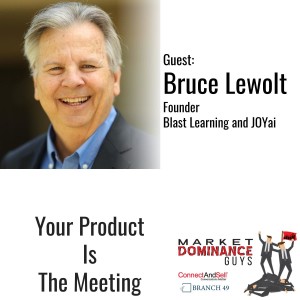
Tuesday Jul 05, 2022
EP139: Your Product Is the Meeting
Tuesday Jul 05, 2022
Tuesday Jul 05, 2022
How many cold-call opportunities have you wasted by pushing hard and fast to sell your company’s product? Today’s podcast guest, Bruce Lewolt, Founder of both JoyAI and Blast Learning, talks about a more caring and effective approach to selling. It starts with switching the goal of that initial call from selling your company’s product to offering prospects a helping hand with a problem or goal they have. Imagine for a moment you’re the prospect, and you’ve just been ambushed by a cold call: Who would you be willing to set an appointment with for a discovery meeting? A person blatantly trying to make a sale? Or a caring professional who understands your business’ needs and wants? In this episode, our three well-reasoned and insightful sales professionals share many insights with our listeners about making a successful cold call, but the one you don’t want to miss is this “aha!” moment. Your job is not selling your company’s product: Your job is selling a discovery meeting. That should make the title of this week’s Market Dominance Guys’ podcast very clear: You’re still selling something, but “Your Product Is the Meeting.”
Listen to Bruce Lewolt's previous episodes in this series:
EP137: What Do Your Prospects Really Hear?
Ep138: Don’t Get Lost in Your Rock ’n’ Roll
More episodes on the topic of Believing in the Meeting are here.
About Our Guest
Bruce Lewolt is Founder of Blast Learning, a service that uses Alexa or Google Assistant as an intelligent personal study assistant, resulting in a state-of-the-art study method that is not just effective but makes learning enjoyable. (See BlastLearning.com and BlastStudy.com) He is also the Founder of JOYai, the first emotionally intelligent and sales-savvy artificial intelligence system for salespeople, bringing intelligent automation to prospecting and selling.
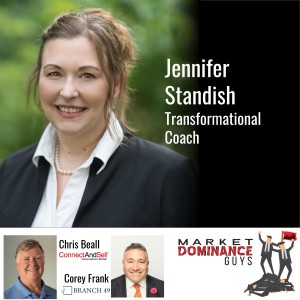
Tuesday Mar 08, 2022
EP123: Hire Yourself a Grandma
Tuesday Mar 08, 2022
Tuesday Mar 08, 2022
Would you hang up on your grandmother? Of course not! Jennifer Standish, Founder of Prospecting Works, joins our Market Dominance Guys, Corey Frank and Chris Beall, in this second of a three-part conversation to talk about the perfect voice for cold-calling success. Certain voices cause people to react in a positive way, and it turns out that a female over the age of 60 has the perfect voice to get that positive reaction needed to be a successful cold-caller. Who knew?! Well, researchers like Jennifer did. She has discovered that with a little training, middle-aged women without an identifiable accent are phenomenal appointment-setters. Corey and Chris enthusiastically agree with her that “grandmas are the untapped labor market we need in sales.” If this sounds bizarre to you, tune in to hear how the nuances of voice affect the trust you need to establish in the first critical moments of a cold call. It’s all on today’s Market Dominance Guys’ episode, “Hire Yourself a Grandma.”
Listen to the first part of this conversation:
EP122: Learning to Manage Your Voice Under Pressure
and the next segment after this one:
EP124: The Magical Type of Cold Call
About Our GuestJennifer Standish is Founder of Prospecting Works, an organization that assists salespeople in overcoming cold-call reluctance. She combines her 25-year cold-calling career with her skills as an intuitive healer, offering a “warm and fuzzy” approach that attracts introverts as well as people who don’t want to be considered salespeople.
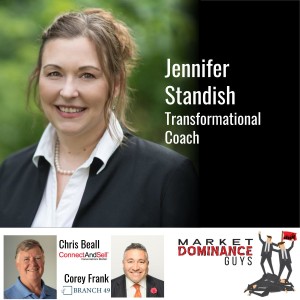
Wednesday Mar 02, 2022
EP122: Learning to Manage Your Voice Under Pressure
Wednesday Mar 02, 2022
Wednesday Mar 02, 2022
Jennifer Standish, Founder of Prospecting Works, is preaching to the Cold Calling Choir when she says that cold calling trainers don't spend enough time working with their people on their delivery. Jennifer and our Market Dominance Guys, Chris Beall and Corey Frank, all believe that a great script that hits all the points but has a terrible delivery won't get you any appointments. However, a great delivery — even if you're working with a mediocre script — will absolutely bring in the appointments. In this podcast, they also emphasize the importance of a salesperson's mindset when it comes to being a successful cold caller. If you think everybody's going to hang up on you, that everybody's going to be nasty to you, well, then, that is generally what you're going to get. But if you believe in your core that your product or service can truly help people, if you are certain of the integrity of your offering, then you can sell people on your belief. Why? Because your authenticity will come through to your prospects, loud and clear. Listen to this first of a three-part Market Dominance Guys' series by these three cold-calling gurus on today's episode, "Learning to Manage Your Voice Under Pressure."
Then, listen to the next two parts of this conversation here:
EP123: Hire Yourself a Grandma
EP124: The Magical Type of Cold Call
About Our GuestJennifer Standish is Founder of Prospecting Works, an organization that assists salespeople in overcoming cold-call reluctance. She combines her 25-year cold-calling career with her skills as an intuitive healer, offering a “warm and fuzzy” approach that attracts introverts as well as people who don’t want to be considered salespeople.
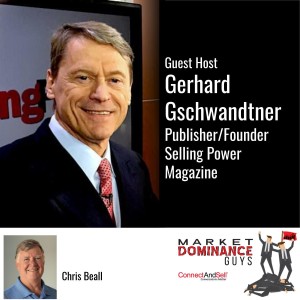
Tuesday Jan 04, 2022
EP115: The Enemy of Your Message Is Drift
Tuesday Jan 04, 2022
Tuesday Jan 04, 2022
The only reliable way to see if your company’s value statement resonates with your prospects is to have lots of conversations with them, and for that, of course, you need salespeople. But as our Market Dominance Guy, Chris Beall, tells our guest host, Gerhard Gschwandtner, founder and CEO of Selling Power magazine, that’s not all you need. You first require an expert to craft the scripted message salespeople will use in their cold calls. And you need a coach to train your callers to deliver that message in the most effective way. Once cold-calling begins, you then need a coach to make sure your salespeople don’t drift from your carefully crafted script and specified way of delivering it. “Under pressure,” Chris says, “we all begin to drift, to try something a little different, something unproven. So, somebody’s got to keep the salespeople together, and that’s the coach.” Join Gerhard and Chris as they provide coaching on the importance of sales-call coaching in this week’s Market Dominance Guys’ episode, “The Enemy of Your Message Is Drift.”
About Our Guest Host
Gerhard Gschwandtner is founder and CEO of Selling Power magazine, as well as CEO of the Sales 3.0 Conference series. Gerhard’s career has always been centered around helping sales leaders create peak performance in business and in life through video interviews, online events, and live workshops and retreats.
Full episode transcript below:
Chris Beall (01:20):
You're going to start with one. Right. This is really simple. So you make a list of some possibilities and then you start putting companies in those lists and then you choose the one that's kind of right-sized. Hey, we think we're going to sell for average sales price of $37,000. That's our guess. And we're going to have a gross margin of 73%. That's our guests because we've looked at our cost of goods and all that. And so if we get about this many looking at our overhead, we will be profitable. That's cool. Or maybe we'll be financable, which is a speculation about future profits.
Chris Beall (01:57):
So we need a market about this big. So let's not make one any smaller than that. And then we're going to make some lists. This is why having the reps make the list doesn't make sense. This process would not work with a bunch of sales reps. This is executive management with the marketing function and the product function, getting together and you make the list. And you go, here's one, here's one, here's one. You could close your eyes and pick one at random, but don't pick two or three and don't address two or three at a time. We address two now, ourselves at ConnectAndSell. We've been in business 15 years.
Gerhard Gschwandtner (02:29):
Wow.
Chris Beall (02:29):
We've been selling successfully in the marketplace for 15 years. We're up to two. I'm thinking of adding a third. I'm almost there, but guess what? My salespeople are not adding the third. We're going to add the third over here in executive mysteries. This is board of directors level stuff. And like, are we going to do this? Because it represents risk and it represents an investment. So how do you choose the ones you're not going to pay attention to? It's all the ones that aren't the one you are paying attention to. One is an easy number. It's a lonely number. It's according to a song,
Gerhard Gschwandtner (03:04):
Right.
Chris Beall (03:04):
Lonely. But you have to be as old as us to even have heard that song Gerhard. So that's what an addressable market is. So I've already addressed this, but I'm going to address it again. Business leaders and sales leaders need to be business leaders. You must dominate at least one market because somebody will. That is whatever you're doing fits in one market, two markets, three markets, whatever, somebody is going to be the dominant player. That's called just math. Right. If you run a race, somebody's going to win the race. I don't need to know who it is to know that it's somebody. There's a little piece of calculus if you remember Gerhard, that they taught us that, right?
Gerhard Gschwandtner (03:42):
Right.
Chris Beall (03:42):
So it's a little fact about curves and this has to do with this maximum and minimum thing. So if you don't dominate at least one market, you have two problems. One is a survival problem because whoever dominates that market is going to choose whether you survive or not. They're going to keep you around kind of as their servant. Oh yeah. You take those, we'll take these, the good ones. You can have the leftovers. Right. So you're the dog under the table, hoping for scraps. That's not the greatest position to be in, especially if somebody can put the dog out or put the dog down, which is not so great. Right.
Chris Beall (04:19):
So the other reason is that it drives valuation. And whether you're a private company or public company or whatever, valuation is an expression of the willingness of others to invest in your future. That's exactly what it is. So you'll get 10 times the valuation for being a dominant player than for being the number two player. So you only have to dominate one 10th as many markets, like one and you get evaluation. That's according to the dominant player, and according to the other factors of your business. Like what are your gross margins, blah, blah, blah, blah, blah. Now I realize in the venture capital-dominated world, this is a funny thing. They don't like this so much. What they want you to do is to spend their money relatively quickly and show that you might have some currency across a whole bunch of potential markets.
Chris Beall (05:16):
And they rely on roughly speaking, only two or 3% of you surviving and the rest turn into salvage operations. So if you want to play that game, you can go play that game. It's still really smart early in that game before you take the venture capitalist money to know that you can dominate one market. So what you do is you just make the list and you go talk to them and you don't even build the product. You just talk to them and you get the resonance and you know the meetings are moving forward. Then go get the money from the VCs and then you won't be conflicted because now you can sell and make them happy, sell and grow.
Chris Beall (05:51):
And meanwhile, you can also be dominating, which is your, that's your safety factor, because guess who you have to deal with at that point? You have to deal with the VCs. And if you dominate one market, if they don't want to fund you in the future, you just tune your overhead down and you're profitable and enjoy life. And then go find another market to dominate. So instead of being in that two or 3% that succeed, you will be in the 100% that succeed. Dominating at least one market assures success. It's very hard to go out of business as the dominant player in one market. It just is.
Gerhard Gschwandtner (06:26):
It's a very, very powerful lesson . And there's something I think a psychological inhibitor that especially in S&B where business owners don't think that way. They think more in terms of survival or meeting immediate needs. But I think that the domination strategy that you're espousing makes a lot more sense.
Chris Beall (06:55):
Well it does. And by the way, it goes along well with survival and meeting immediate needs in a funny way. But it does mean you have to have the discipline to not do deals with folks that are not in your market. Or to reevaluate a very specific question, which is, did we just miss them? We should have put them in the list and we didn't. But I tell you confirmation bias will make you invite unwanted guests into your market and they will distract you. The disease that kills companies is distraction. That's why little companies shouldn't do quote-unquote strategic partnerships with other little companies. They give each other the disease called distraction and it's highly communicable. So be careful of it. You need focus. And the focus is, starts with the list. It's really easy to stay focused when you have that list.
Gerhard Gschwandtner (07:45):
Yeah.
Chris Beall (07:45):
You can go through the list and say, have we talked to everybody on this list? We haven't. Let's take the ones we haven't talked with and try to talk to them. Okay. If somebody wants help doing that, come to me. I can help you talk to a whole bunch of people. That's what we do, is like to folks. Right. And we help you talk to people. Have we got a meeting with everybody on the list? Not yet. Well, we have a job to get a meeting with the rest. Have we learned from the meetings that we've had? What resonates? So what percentage are resonating on the economics, what on the emotional, and what on the strategic, and what didn't resonate at all? That's a little trickier, but it's very objective step, by step, by step.
Chris Beall (08:26):
And by going step by step, we do take care of immediate needs. Because guess what? We'll actually be closing business sooner than not. And the best part is it keeps getting easier instead of getting harder. That's the reason you do this. Now here's a funny thing about markets and it's really awkward. One is you need different people to go on a market dominance program than are normally hired. And we already saw the answer in the poll. You need either externally or internally, somebody to do dispassionate research and make that list. And they cannot be distracted by oh, their comp plan for instance, right? I mean, it's like, can you imagine CEO of the company goes well, I made the list like this. It turns out it took us right off a cliff, but it helped me make an extra $50,000 last year. Like no, you get fired for that as a CEO. Well, this as a person has to have the CEO hat on, so to speak and they've got to be tied to future market dominance. So you need to hire either internally or externally somebody to do research.
Chris Beall (10:19):
Research. You also need to either hire or put in place processes that cause you to have a structured identical message that asks the question, do you care about the economics? Do you care about the motions or do you care about the strategy piece of what we offer or nothing? And you need to have people who are expert at delivering that. That means you got to hire somebody to help you put together a message that reliably, I call it taps the bells. So think of it like this. You have an assembly line going by you and your job is to determine which of these things that look like bells are actually bells. I was just in Italy and they have beautiful bells there and they're made out of whatever they're made out of metal, right, brass, bronze. I don't know how they make bells.
Chris Beall (11:06):
So they have these beautiful bells. But what if the bells could be made of clay? And they just go thud and they look identical. They weigh the same and they're going by you. And your job is to figure out which ones are bells that we can ship to our customers and which ones are duds that we have to just send back to be crushed up into clay again. Well, you tap them. Boom or thud. Right. That's what we do with conversations.
Chris Beall (11:35):
The only reliable way to determine that somebody is resonating like a bell with our message is one, to have a message. So we need to hire somebody who is really good at putting together a message that works psychologically for people so that they will resonate or not with one of these three elements. It's simple. It doesn't take very long to do. But now we need to hire another person and could be the same person, a coach to make sure that everybody's staying precisely on that message because the big problem with focus is the enemy of focus is drift. So distraction leads us to be scattered, but drift and Gerhard you and I know this well, right? We're both golfers. And we both know what happens to our golf swings.
Gerhard Gschwandtner (12:22):
Right.
Chris Beall (12:23):
When we quote-unquote, find something, right, on the range or whatever, or we have a lesson or whatever it is and we kind of got it, what happens? Under pressure of playing on the actual golf course, whether competitively or not, we begin to drift. We're tempted to try something a little different, right? We're tempted. And it's why golf is this funny game, right? It tempts you inside your mind to try something unproven because that last one didn't work so well, I'll try this. So drift is the enemy of the precision you need to have your message delivered the same every time, which it takes to know if you're resonating.
Chris Beall (13:06):
That is if sometimes I'm tapping the bell and sometimes I'm just waving a stick around, and sometimes I pick up a little hammer into it, and sometimes I do it with my finger, I'm not learning about bells. I'm learning about hammers and fingers. I'm learning about my reps. So somebody's got to keep the reps together and exploring the market systematically with a message. And that's a coach. Coaching needs to be done in real-time. Just like a golf swing. You can't bring me your golf swing from last week. Describe it to me and I'll coach you. I got to watch you while you're doing it and go, Gerhard, remember when it was really, really great because you actually had your right hand a little bit more on top of the club so your wrist could hinge rather than the thing you're doing right now with the thumb behind it that ain't going to work. Right.
Chris Beall (13:53):
In real-time, we could do that. At the end of the week, you're describing it to me. That's how we tend to coach sales reps. We get them together on a one-on-one at the end of the week and then we tell them war stories or we ask them how it's going or whatever. Right. This is performance. This is performance. And we've got to have a coach who coaches to performance in real-time. And then of course, we need to hire people who can have the conversations. By the way, they can be junior people, they can be senior people as long as they sincerely believe in the potential value of the meeting that they're selling, but they got to sell the meeting. The meeting is the first concrete step into the market that tells you whether that resonance is happening.
Chris Beall (14:33):
How do you know the bell rings? They take the meeting. Not they said a nice thing. Oh, I'm interested. Send me some information, blah, blah, blah. No, no, no. They take a meeting. So you've got to be trying to sell the meeting, but what's valuable in the meeting, learn it. So your reps have got to know what's valuable in the meeting, right? So you have to hire the right kind of people. You have to train them up to sell the meeting. You got to coach them in real-time and they need to avoid drift. Otherwise, you don't know what's going on in your market. That's a bunch of very practical things to do. And then your list is made by a research team or by marketing, if they're doing it honestly. And the driver for that is the company strategy.
Gerhard Gschwandtner (15:12):
I think you did a lot of thinking on your vacation about this because we have done a number of webinars together. And this is an experience today where you come up with a lot of clarity and a lot of good insights that are fundamental to running a business that's focused on market dominance. The enemy of focus is drift. We got to share it on Twitter. We got to share it on LinkedIn because so many salespeople drift away from their process, from their script, from their story, and they improvise like you and I do on a golf course.
Chris Beall (15:53):
Exactly, exactly. And they do it because it's uncomfortable doing the other thing. And by the way, you need to build what is conventionally considered sales pipeline in order to know that you're dominating the market. You got to actually be engaging with folks. That first engagement is probably going to be an ambush conversation. And the reason is simple. You can't figure out that resonance with the economics, or the emotions, or the strategy by sending somebody an email. The clever email that gets somebody to take a meeting, for instance probably is not a gate other than this is a person who takes meetings. That's not what you're looking for. You're actually, you have to do it the other way around. Define the role and the company and then talk to them. But the first time you talk to them, they're probably not going to be as ready for you to talk to them. You got to ambush them. It's kind of sad actually, but you got to do it.
Chris Beall (16:52):
And so to build that pipeline, we have to have first conversations. And first conversations with strangers are extremely uncomfortable. In fact, they're right at the edge of choosing to be exiled from the village. If you want to kind of go in the hierarchy of bad things that humans really don't like, here's what they don't like. One, they don't like invisible strangers. They don't like them. Because in the environment of evolution, I'm reading The Decameron right now, by the way, Boccaccio's Decameron. Right. So even just back there in Florence, in the 1300s, just then not that long ago, it was dark at night. There were no electric lights. Probably a quarter of the stories that those 100 stories involve an invisible stranger. Invisible strangers are scary, scary things. They're not here to bring us a Bud Light.
Chris Beall (17:46):
They're the bad people from across the river. We're really civilized in the village that we live in. We paint our faces vertically. Those horrible people, they paint them horizontally. That's terrible. Everybody knows that's bad, except them apparently. And they speak a little differently and they eat food that smells not quite like ours. And when they show up at night, that's why they're invisible. And they're not here to bring us a Bud Light. They're here to change the demographics of our village to look more like their village because we won't be here anymore. So we don't like invisible strangers. And we don't like exile. We don't like being kicked out of the village. So here we are getting those emotions about being an invisible stranger and maybe being rejected by somebody, exiled. And we package it all together and call it a cold call.
Chris Beall (18:38):
And it's awkward and it's tough. It's not as tough as people think. You can learn how to do it. And you have to have the right mindset and you teach mindset, been teaching mindset for years, how important it is. And you have to have the right technique. And I'll compare this to surfing. It's like being a surfer. It's very artistic. It's very beautiful. And you're probably not going to shape your own surfboard because you don't know-how. When you're learning to surf, you surf on somebody else's, on a board that was made for surfing, not on your eye idea of a surfboard. The script you're going to use is just like the surfboard. It's shaped by an expert so that you can bring your emotions out and be human. You don't have to invent the words and wonder whether the words are right, wrong, or indifferent.
Chris Beall (19:24):
You don't have to worry whether you're using colloquialisms or too many syllables or whatever and got the pace wrong or whatever. You can actually work with a script just like working with a surfboard that was designed by an expert based on years and years and years of experience and experimentation. And then you can get comfortable there and express yourself like the surfer using their body, using their balance, using their cerebellum, all that stuff they use in order to make that beautiful move on the wave. They didn't invent the board. Right. So your speaking voice is the surfer. That's where your artistry is. That's where your humanity comes out. I'll just give you a little piece of computer science here. It's actually information science. As you know, that's one of my backgrounds, right? I'm a,
Gerhard Gschwandtner (20:10):
Right.
Chris Beall (20:11):
Written millions of lines of code and all that kind of horrible stuff. And I'm a physicist and mathematician by background. I look at this like this. How much information is going back and forth as we're building our pipeline? Because it takes a lot of information to get somebody to trust you enough to listen to you, enough to get to the point where they might resonate with your message. Well, if I send you an email, I've got about 5,000 bits of information in there, if you read it. That's just information theory. A character of information is about 10 bits and I can add them up. I might get to 5,000 bits. When I'm speaking with you, that's 20,000 bits a second. So an email corresponds to one-quarter of one second of human speech. And yet there's not all the words of the email in that one-quarter of a second.
Chris Beall (20:59):
So what's in there? Is it just waste? Probably not. Right. Evolution kind of carries that stuff away. It's the emotional content coming from the tone of voice. It's who am I and can you trust me? That's what's coming in my voice and that's actually all of the 20,000 bits except the words. So the job of the words is to carry the voice. It's the job of the voice to create trust. It's the purpose of trust to allow us to get curiosity. It's the job of curiosity to get somebody to commit to doing something they don't want to do, which is to spend more of their time with us or with our expert. And then it's the job of that expert of the expertise to actually explore the possibility of working together to solve a problem.
Chris Beall (21:47):
So we've got a handle in our sales pipeline that first little bit. How long do we have to do it? According to Chris Boss of the FBI, used to be with the FBI, he told me the answer to this question one night, seven seconds. We have seven seconds to get somebody to trust us. So our sales pipeline really is this. Of that list we made, how many of those folks in that list now have some trust with somebody on our team because that person had a conversation with them and executed the first seven seconds correctly. That's the beginning of your pipeline. The rest of the pipeline flows naturally from the mathematics of the situation. Put more in, you will get more out. When somebody tells me there's a quality, quantity disparity, well, yeah, I have very high-quality conversations. I just don't have very many of them. It's like that's nonsense, because that's saying your psychic. You know in advance everybody who's going to buy.
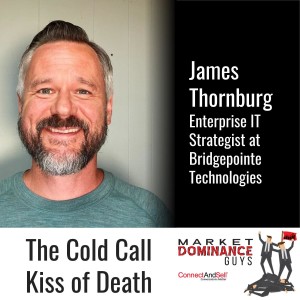
Tuesday Dec 21, 2021
EP113: The Cold-Call Kiss of Death
Tuesday Dec 21, 2021
Tuesday Dec 21, 2021
There’s a decided difference between the purpose of a cold call and that of a discovery call. During a discovery call, marketing language, also known as “selling your product or service,” is entirely appropriate. But if you foolishly use marketing language during your first conversation with a prospect — well, that, my podcast friends, is the cold-call kiss of death. Join these three successful cold-callers as they discuss the components of each type of call and warn you away from the two biggest cold-calling mistakes. James Thornburg, Enterprise IT Strategist at Bridgepointe Technologies, continues his conversation with our Market Dominance Guys, Chris Beall and Corey Frank, in order to provide you with some guidance about this important difference. Listen in to borrow from the best as these three professional salespeople lend you their expertise on this Market Dominance Guys’ episode, “The Cold-Call Kiss of Death.”
About Our Guest
James Thornburg is the Enterprise IT Strategist at Bridgepointe Technologies, which offers a service that helps design IT and telecom projects for their clients and includes selecting the right supplier at the right price with no extra cost to their customers.
Catch his previous episode here: Is Cold Calling a Form of Slapstick?

Tuesday Nov 16, 2021
EP108: Sales and the State of Apprehension
Tuesday Nov 16, 2021
Tuesday Nov 16, 2021
Nobody likes to be told what to do. But in sales that’s exactly what we do: We tell our prospects what to do. With each cold call or discovery call, we’re basically saying, “Buy this!” No wonder prospects on the receiving end of a sales call feel apprehensive and try to end the call quickly! Matt McCorkle, Manager of Branch Operations for Kaeser Compressors, joins our Market Dominance Guys, Chris Beall and Corey Frank, for a dissection of this sales problem. How do you take a prospect from that state of apprehension, where they fear they’re going to be sold to, and get them to a state of pride, where they are comfortable enough to share their company’s pain and open the door to true discovery? Join Matt, Chris, and Corey as they talk turkey on this Market Dominance Guys’ episode, “Sales and the State of Apprehension."
About Our Guest
Matt McCorkle is Manager of Branch Operations for Kaeser Compressors. He has earned both a bachelor’s degree and a master’s degree in mechanical engineering and has now been with Kaeser Compressors for 13 years.
Listen to the next installment of this interview with Matt McCorkle
Being There for Your Customers
And the first one -
EP107: On the Phone, They’ll Tell You the Truth!
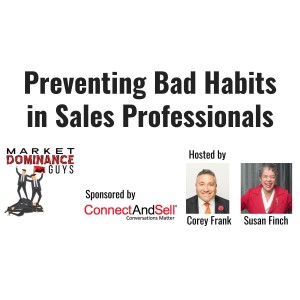
Tuesday Aug 17, 2021
EP95: Not Getting Trained? Train Yourself.
Tuesday Aug 17, 2021
Tuesday Aug 17, 2021
How do you improve your cold calling skills if your present company isn’t providing any sales training? Train yourself! Until you can get with the right company, borrow ideas from the best sales experts you can find (many have been guests on this podcast), take improv classes, join Toastmasters, and keep your mind open to absorb what works. Our Market Dominance Guy Corey Frank is talking in more depth about training yourself during this second part of his conversation with Susan Finch, president of Funnel Media and Funnel Radio. He advises listeners that salespeople should fall in love with their craft — not the product they’re selling. How do you do that? Care about the potential value of the meeting for your prospect and remember the “why” of what you’re doing. And what skills should you hone? Learn what moves prospects to make a decision, create a well-written script and adhere exactly to it, use the tone of voice that elicits the response you want, and most importantly, leave your own mood and ego behind when you make a cold call. Train yourself to remember that it’s not about you. When you place a call, it’s showtime!
Listen to the first half of this interview here:
Are You Laying Brick, or Making $12 an Hour?

Tuesday Jul 20, 2021
EP91: Borrowing from the Best
Tuesday Jul 20, 2021
Tuesday Jul 20, 2021
This week’s Market Dominance Guys’ podcast wraps up a terrific three-part conversation between our guys, Chris Beall and Corey Frank, and their guest, Henry Wojdyla, Founder and Principal of RealSource Group. Today, Corey asks Henry how he’s finetuned his business perspective and cold-calling technique since his recent immersion in Market Dominance Guys. “I copy and steal religiously,” Henry freely confesses. “I’ve wholesale stolen Chris’ approach.”
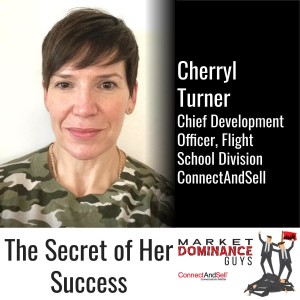
Wednesday Mar 31, 2021
EP75: The Secret of Her Success
Wednesday Mar 31, 2021
Wednesday Mar 31, 2021
In this week’s Market Dominance Guys’ podcast, Chris Beall conducts a solo interview with Cherryl Turner, Chief Development Officer of ConnectAndSell’s new Flight School Division. In the first episode of this two-part conversation, Cherryl relays to Chris how she got started in cold calling and about the important experiences she had talking with prospects — experiences that helped shape how she approaches cold calls and conducts meeting-setting conversations today.
As an example, Cherryl recounts a pivotal moment during a call with a prospect, in which she had the impulse to stop talking and just listen — instead of pushing to make the sale — and how the whole tone of the conversation warmed up after that. This was a career changer for her! Chris alludes to this when he describes Cherryl, touting her practice of conversing with each prospect as a peer and the way she is constantly looking to understand and help them. Feel free to borrow everything you’ll learn in this week’s Market Dominance Guys’ episode, as Cherryl Turner shares “The Secret of Her Success.”
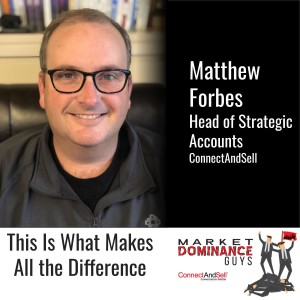
Tuesday Mar 23, 2021
EP74: This Is What Makes All the Difference
Tuesday Mar 23, 2021
Tuesday Mar 23, 2021
“Everybody knows that the flow of discovery meetings is the constraint on their business.” So states Chris Beall, CEO of ConnectAndSell, as he and Corey Frank, our two Market Dominance Guys, continue their interview with Matthew Forbes, Head of Strategic Accounts at ConnectAndSell. Together, they explore the epiphany that is behind Matt’s recent 4-times uptick in his call-to-meeting ratio. So, what is it that increased that flow for Matt recently, and how can others adopt what he learned so that they too can increase the number of meetings they set?
“I think we let people off the hook,” Matt says, “because they’re busy.” It’s second-nature to get apologetic or back down when the prospect starts making noises like, “Not now” or “Call back later.” But Matt’s epiphany about his true belief in the value of the discovery meeting and in the value of ConnectAndSell for the person he’s talking to, has changed the way he delivers his message. “You’ve got to have the right words, but the words only get you so far.” As Matt explains, if you truly believe in what you’re offering, your tone of voice will communicate that belief. As you’ll hear in this week’s Market Dominance Guys’ episode, “This Is What Makes All the Difference.”

Thursday Mar 18, 2021
EP73: You‘d Better Believe It
Thursday Mar 18, 2021
Thursday Mar 18, 2021
This week, our Market Dominance Guys, Chris and Corey, interview Matthew Forbes, Head of Strategic Accounts at ConnectAndSell, about an epiphany Matt had that increased the meetings he set by almost 400%. Wow! What could possibly change that would explain that kind of increase? Well, it’s actually a simple change, but it’s a very necessary one: Matt came to truly believe — deep in his soul — in the potential value of the discovery meeting for his prospects, even if they were never going to do business with ConnectAndSell. His messaging script didn’t change at all. It was his belief that did. Listen to today’s Market Dominance Guys episode, “You’d Better Believe It!” to learn how Matt came to make this meeting-setting leap.
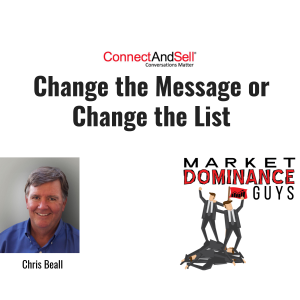
Wednesday Sep 09, 2020
EP47: Change the Message or Change the List
Wednesday Sep 09, 2020
Wednesday Sep 09, 2020
How long will it take to get the meeting? You have three steps first:
1. Make the list. And review that list and eliminate the dumb titles. Chris is a fan of Zoominfo.
2. Write the messaging. Remember, one turn of phrase can kill the meeting. Marketing language kills a sales call. Subtle nuances make or break the call.
3. Talk to people in that market, those that are intrigued enough to hear what we have to say. Who does the talking? Find and hire the ASKERS.
Tune in for this short episode of Market Dominance Guys: Change the Message or Change the List
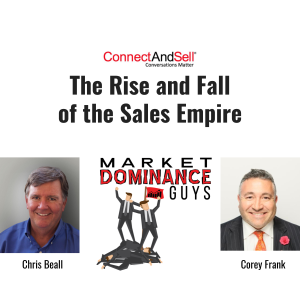
Monday Mar 02, 2020
EP22: The Rise and Fall of the Sales Empire
Monday Mar 02, 2020
Monday Mar 02, 2020
The earliest civilizations on earth developed between 4000 and 3000 BC when the rise of agriculture and trade allowed people to have surplus food and economic stability. Many people no longer had to practice farming which allowed for a diverse array of professions and interests to flourish in a relatively confined geographic area. The use of fire, the advent of the wheel, learning to domesticate animals, and come up with this cool thing to record progress called writing, all of these became milestones as we climbed the “civilization tree.
Later, in the colonial rush in the mid 16th century, the Western Europeans brought even newer technologies, ideas, plants, and animals that were new to the Americas and would transform peoples' lives – some not necessarily for the better: Things such as guns, iron tools, and weapons; But also Christianity and Roman law; sugarcane and wheat; horses and cattle all became hallmarks of a “civilized” society.
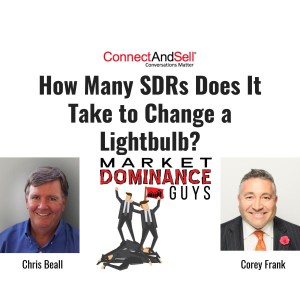
Monday Jan 06, 2020
EP16: How Many SDRs Does It Take to Change a Lightbulb?
Monday Jan 06, 2020
Monday Jan 06, 2020
Almost 400 years ago, in the early 17th century in Europe, tulip bulbs were considered hard currency. 200 years ago, many islanders of the South Pacific used bleached seashells to flaunt their wealth. 100 years ago, many Texans measured their success by how many heads of cattle they ran. And today, my 8-year-old measures his wealth by the rare skins and VBucks he accumulates through his Fortnite gaming efforts. But today, if you’re a CEO or senior business leader in B2B tech markets, you may also have an alternative form of capital that should be leveraged in every way that the currency in your bank account is currently deployed: If you have created the function of an SDR team – regardless of the size - they are indeed a source of capital that operates in many ways like traditional capital and is also liquid.
Since our focus at the Market Dominance Guys is lending a hand to companies and offering techniques and insight to market penetration, transitioning to NEW and additional markets may be something that isn’t at the top of the list. But, Geoffrey Moore argues – as we discussed in an earlier episode about his book, “Crossing the Chasm” - that breaking into any market is an aggressive act. And as such, Moore proposes a specific and consistent and testable strategy for moving from one market to the next with success. And testing and entering a new market is often a much more simple exercise than many realize…especially if you have the alternative capital – SDRs – to invest in it. It is through your SDR team, after all, that is the means by which you're going to identify the ripeness and opportunity that exists in a new market.
With their number one job to be an instrument of market exploration and their number two job to be an instrument of market expansion.
That’s why, in essence, the mighty cold call is the essence of this entire market domination thing. Namely, can you hire and train and coach your SDRs to speak empathetically enough to get the prospect to trust them enough in 30 seconds and be curious enough that this curiosity can be transformed into commitment, and that this commitment will turn into the action of actually showing for the meeting.
In this episode, we explore the power of deploying SDRs…how, how many, and when…and why the more markets our SDRs can validate, the less our chances are of going out of business. This is the Market Dominance Guys and this week’s episode, “How Many SDRs does it take to Change a Lightbulb?”

Wednesday Nov 06, 2019
EP10: Are You Serious About Reaching the Top of Your Market?
Wednesday Nov 06, 2019
Wednesday Nov 06, 2019
What do you need to believe when you ask someone for 15 minutes of their time? What’s the underlying emotional and rational DNA of true belief that is pulsing through your brain?
And even beyond this, it would be helpful to remind our listeners about our mission here at the Market Dominance Guys…what’s the real reason these nuances and steps and tactics of market dominance even matter? Because, after all, if we don't get past the discovery step consistently we can never dominate our market.
So all of these steps are not necessarily put in place for the salesperson themselves to be successful, although that is great byproduct; The real underlying purpose of all of this is to provide an alternative or an adjunct to the traditional funding, mergers, and acquisitions as a way of executing corporate strategy …That’s actually the purpose of all this…as my esteemed and candid co-host is very fond of saying, “You can go sell any damn way you want…if you DON’T want to dominate markets. Why? No one will care.”
In this episode, I poke Chris into a controlled burn on the mathematics, the reasoning, and the basic economics of how to dominate your market…and why it matters even more in today’s booming economy. This is “No Tourists Allowed: Are You Serious about Reaching the top of your Market.”
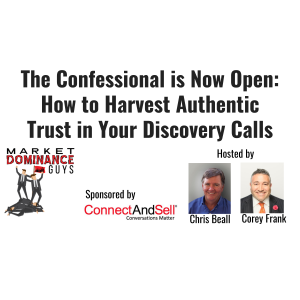
Wednesday Oct 30, 2019
EP9: How to Harvest Authentic Trust in your Discovery Calls
Wednesday Oct 30, 2019
Wednesday Oct 30, 2019
Ask 50 bartenders how to make the best Tom Collins and 48 out 50 will tell you: Pour 1 oz Freshly squeezed lemon juice, 1 1/2 oz Gin, 2 oz Carbonated water and 1/2 oz Sugar syrup and shake. Now ask 50 sales professionals how to “make” the best Discovery call and you’ll get 50 different answers. Have an agenda. Build rapport. Establish time frames. Set a power frame. Identify a budget upfront or don’t do the call at all. Do a question stack. Talk a lot. Talk a little. It seems that everyone has their own recipe, and yet they are still calling it by the same name. Now sales discovery calls have been around at least as long as the vaunted and debonair Tom Collins. So why do they differ so broadly, and what ARE the necessary ingredients for creating a great Discovery session? In this session of the Market Dominance Guys, I ask Chris – a master mixologist in his own right – for the best additives – including trust, tone, and pace to earn a true confession in a Discovery. This is “The Confessional is Now Open – How to Harvest Authentic Trust in your Discovery Calls”

Thursday Oct 24, 2019
EP8: How to Free Solo Your Pitch
Thursday Oct 24, 2019
Thursday Oct 24, 2019
Alex Honnold, one of the most talented mountain climbers in the world – who is the only man to ever successfully summit El Capitan free solo – and that means no ropes - by the way – had a strategy. And his strategy did not reach the top of the mountain. That was his ultimate destination. His strategy was to map the 30 sections – or “pitches” as they are called in climbing parlance - and practice the necessary and wide variety of different skills needed to manage each of these 30 precarious steps. Now as a sales professional, I find it fascinating that climbers call each section of a mountain a pitch…especially because, in this episode of the market dominance guys, Chris talks about strategy in much the same way Alex attacks a mountain…as simply a list of necessary and intermediate destinations leading to the summit or close. And each of these strategies needs to employ the proper tactic – or in this case – the proper pitch. This episode of Market Dominance Guys is “How to Free Solo your Pitch”.

Tuesday Oct 15, 2019
EP7: Don‘t Make the Spiders Angry
Tuesday Oct 15, 2019
Tuesday Oct 15, 2019
There is a universal product that every company has that it needs to better understand and sell more effectively and correctly. And it's a product that can be crafted and messaged just like any other product your team sells. Because it’s a real product, it requires belief in its potential value and worth from the folks that sell it. It’s a product that shouldn’t be short-cut or mis-messaged…or even try to do too much. It needs to be measured for effectiveness. And the ability to get this product in front of your list is also one of the keys to market dominance. That product is the Discovery Meeting or Discovery Call. In the episode, I ask Chris to separate fact from fiction and put some sound data and reasoning behind this misunderstood and much-maligned tool. This episode of Market Dominance Guys is The Right Tool for the Right Job, or as I like to call it, Don’t Make the Spiders Angry.

Monday Oct 14, 2019
EP2: The 3 Features & 3 Strategies Every Startup Must Have
Monday Oct 14, 2019
Monday Oct 14, 2019
In our journey to Market Dominance, Hope springs eternal…it does in sales forecasts…in product rollouts…and especially in venture fundraising.
“But Hope is not a strategy. And Luck is not a factor. And fear is not an option.”
In this episode, I ask Chris about the key features and strategies every startup must-have. I brought extra paper expecting a long list…but to Chris, things are simplified…there are only three.
So arm yourself! Tune in to this episode of Market Dominance Guys to hear Corey and Chris and let’s now dive into the 3 Features & 3 Strategies Every Startup Must Have.